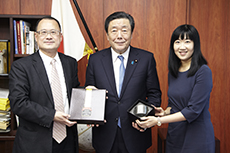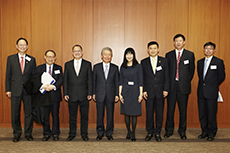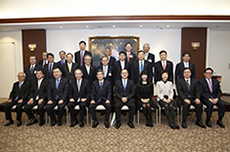 The 35th Japan-Hong Kong and Hong Kong-Japan Business Co-operation Committee Plenary meeting was held in Tokyo on 23 March 2016. Senior Hong Kong and Japanese business leaders participated in the annual bilateral meeting.
The 35th Japan-Hong Kong and Hong Kong-Japan Business Co-operation Committee Plenary meeting was held in Tokyo on 23 March 2016. Senior Hong Kong and Japanese business leaders participated in the annual bilateral meeting. The front row (from left): Mr Akira Okada, Executive Vice President, ALL NIPPON AIRWAYS CO., LTD; Mr Michihiko OTA, Vice Chairman, Marubeni Corporation; Mr Yutaka Nagao, President, Yamato Transport Co., Ltd; Mr Kuninori Matsuda, Consul-General, Consulate-General of Japan in Hong Kong; Mr Katsunori Nagayasu, Chairman, Japan‐Hong Kong Business Co-operation Committee; Dr Jonathan Choi Koon-shum, BBS, JP, Chairman, Hong Kong-Japan Business Co-operation Committee; Ms Margaret Fong, Executive Director, Hong Kong Trade Development Council; Ms Sally Wong, Principal Representative, Hong Kong Economy and Trade Office (Tokyo) (Ms Wong stepped down as the Principal Representative effective from April 2016); Mr Bob Chong, Managing Director, Chungnam Corporation Limited; The Hon Jeffrey Lam, Managing Director, Forward Winsome Industries Ltd.
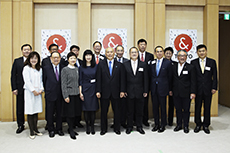 Members of the Hong Kong-Japan Business Co-operation Committee paid a visit to Yoichi Masuzoe, Governor of Tokyo (front row, centre)
Members of the Hong Kong-Japan Business Co-operation Committee paid a visit to Yoichi Masuzoe, Governor of Tokyo (front row, centre)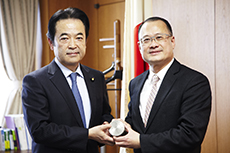 Dr Jonathan Choi, Chairman of the Hong Kong-Japan Business Co-operation Committee (right) met with Tsuneo Kitamura, Parliamentary Vice-Minister of Economy, Trade and Industry (METI)
Dr Jonathan Choi, Chairman of the Hong Kong-Japan Business Co-operation Committee (right) met with Tsuneo Kitamura, Parliamentary Vice-Minister of Economy, Trade and Industry (METI) 15 April 2016 – Regional economic integration opportunities were the central theme of the 35th Plenary Session of the Hong Kong-Japan and Japan-Hong Kong Business Co-operation Committees on 23 March 2016.
A total of 27 business leaders from Hong Kong and Japan attended the Plenary Session in Tokyo. The meeting was co-chaired by Dr Jonathan Choi, Chairman of the Hong Kong-Japan Business Cooperation Committee and Chairman of Sunwah Group and Mr Katsunori Nagayasu, Chairman of the Japan-Hong Kong Business Cooperation Committee and Chairman of The Bank of Tokyo-Mitsubishi UFJ, Ltd. (Mr Nagayasu assumed the new position as Senior Advisor effective from April 2016)
Asia-Pacific Cooperation
In his opening remarks, Mr Nagayasu discussed the value of regional economic agreements, such as the Trans-Pacific Partnership (TPP) and the Japan-China-Korea FTA and RCEP (Regional Comprehensive Economic Partnership). He said: “Japanese companies will utilise these economic partnership agreements so that it will lead to the global development, not only the economy of Japan but the entire Asia region.” He also commented on the role of Hong Kong in these wider economic agreements and stated that, “Hong Kong is the world’s major financial centre and distribution centre, and therefore, Hong Kong is an indispensable partner for our country.”
During the Japan Economic Update, Mr Eiichi Yoshikawa, Senior Managing Executive Officer, The Bank of Tokyo-Mitsubishi UFJ, Ltd, also emphasised the importance of regional economic integration as a growth strategy for Japan and said “Prime Minister (Shinzo) Abe considers the TPP as one of the important strategies.”
China’s Economic Transition
During the Plenary’s second session, themed “Economic Implications of China’s 13th Five-Year Plan”, Dr Choi shared his insights on Hong Kong-Japanese cooperation to leverage emerging opportunities from the Chinese mainland. He explained that, in this latest edition of China’s Five-Year Plan, launched in March this year, “the mainland is transitioning towards an economy based on the production of high-value-added goods and the development of services”, and added that, “This emphasis on promoting services plays to Hong Kong’s strengths, with our city being one of the most services-oriented economies in the world, accounting for more than 90 per cent of our GDP.” Dr Choi said that “As the mainland opens up its services economy to the rest of the world, Hong Kong and the companies that operate in our city, can enjoy first-mover advantage in tapping these opportunities. And because of our deep and close links with the mainland, we have the experience and talent pool required to turn these advantages into business success.”
Hong Kong Advantage
During the third session of the Plenary, Margaret Fong, Executive Director, Hong Kong Trade Development Council (HKTDC), emphasised Hong Kong’s advantages as an effective platform for Japan to promote inbound tourism. Ms Fong highlighted the fact that “among the more than 19.7 million visitors to Japan last year, more than a quarter of them were from the Chinese mainland; this sector also contributed 41 per cent of tourism spending (total 1.4 trillion yen) in 2015.” She went on to say that, “With Tokyo set to stage the 2020 Summer Olympics in just four years’ time, Japan’s government aims to increase the number of tourists to 30 million by 2020. And Hong Kong, I believe, can help Japan achieve this target in a variety of ways.”
She noted that Hong Kong has a “strong appreciation of Japanese culture” and that “Japanese food, brands and fashion are not only sought-after by Hong Kong residents, but also by our tens of millions of visitors each year.” Referencing the nearly 60 million visitors Hong Kong received in the past year, including close to 46 million from the mainland alone, Ms Fong said that Hong Kong is a “great shop window for Japanese products and brands to capture the attention of people from different parts of the globe, and especially our mainland visitors who are keen to see more of the world.”
Ms Fong presented the HKTDC as “another effective avenue to attract tourists to Japan through the more than 30 international fairs staged by the HKTDC in Hong Kong each year.” She highlighted the various HKTDC-organised trade fairs and events, including the HKTDC Food Expo, Hong Kong International Tea Fair, InnoDesignTech Expo, HKTDC Hong Kong Book Fair, Hong Kong International Film & TV Market (FILMART), and Hong Kong International Licensing Show, as key platforms that Japanese companies have leveraged to attract global interest in their products, brands and culture. Ms Fong concluded her presentation by encouraging the Japanese delegates “to leverage Hong Kong’s strengths as well as events organised by the HKTDC, to draw more visitors to Japan.”
The HKTDC serves as the secretariat for the Hong Kong-Japan Business Co-operation Committee, while Keidanren is the secretariat for the Japan-Hong Kong Business Co-operation Committee. The two committees will hold their 36th Plenary Session next year in Hong Kong.

